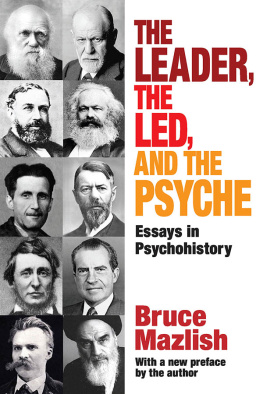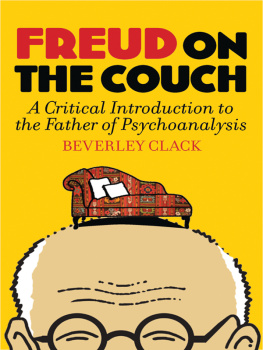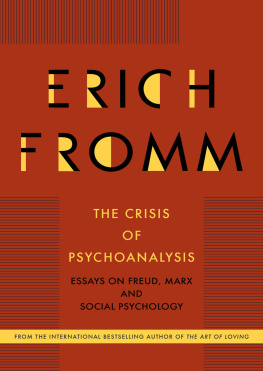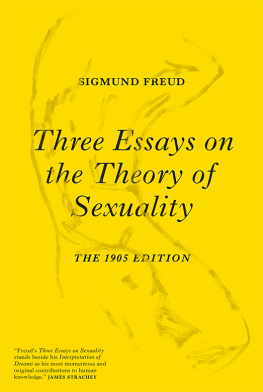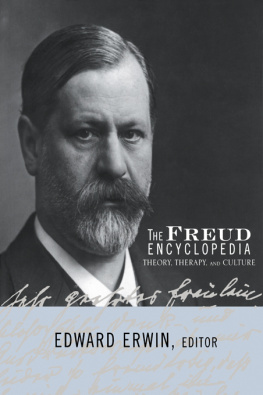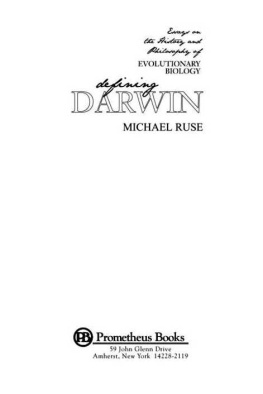Originally published in 1990 by the University Press of New England.
Published 2013 by Transaction Publishers
Published 2017 by Routledge
2 Park Square, Milton Park, Abingdon, Oxon OX14 4RN
711 Third Avenue, New York, NY 10017, USA
Routledge is an imprint of the Taylor & Francis Group, an informa business
New material this edition copyright 2013 by Taylor & Francis.
All rights reserved. No part of this book may be reprinted or reproduced or utilised in any form or by any electronic, mechanical, or other means, now known or hereafter invented, including photocopying and recording, or in any information storage or retrieval system, without permission in writing from the publishers.
Notice:
Product or corporate names may be trademarks or registered trademarks, and are used only for identification and explanation without intent to infringe.
Library of Congress Catalog Number: 2013015886
Library of Congress Cataloging-in-Publication Data
Mazlish, Bruce, 1923
The leader, the led, and the psyche : essays in psychohistory / Bruce Mazlish, with a new preface by the author.
pages cm
1. Psychohistory. I. Title.
D16.16.M38 2013
901.9--dc23
2013015886
ISBN 13: 978-1-4128-5185-5 (pbk)
ISBN: 9781351480185 (ebk)
T HIS book would not have come into existence without the suggestion of Jeannette Hopkins, the Director of the Wesleyan University Press, and her editorial skills have played a key role in shaping it. My debt to her is great. I also wish to record my thanks to Thomas L. McFarland, Director of the University Press of New England, who oversaw the promotion of the book once the Wesleyan University Press operations were put under his supervision.
In a book such as this, the product of many years of work and reflection, memories come crowding to the fore. My first go to my graduate school mentors, Jacques Barzun and Shepard Clough. The former, although he came to oppose psychohistory rather vehemently, taught me to move bravely across the terrain of interdisciplinary work in history; the latter instructed me in the virtues of keeping ones feet on historical ground while having lofty thoughts. Together, my two mentors, existing uneasily as joint supervisors of my thesis, The History of Conservative Thought: Burke, Bonald, and De Maistre, unwittingly prepared me for living with ambivalences.
As I moved toward work in psychohistory, as part of my general interests in history and its methodology, Erik H. Erikson was a major inspiration, illuminating both psychoanalytic theory and its application to historical materials. Among many who taught me much about psychoanalysis were Francis de Marneffe and Arthur Valenstein. A good deal of my learning also took place at the Wellfleet Conferences, so called, where I was fortunate to have as colleagues not only Erikson but also Robert Lifton and later Kenneth Keniston (now, happily, my colleague at M.I.T.). The meetings of the Group for Applied Psychoanalysis (GAP) over the course of 15 years or so were a constant source of interest; of its members, Norman Holland and Abraham Zaleznik, who co-founded the Cambridge-Boston GAP with me, figure fondly in my memories.
In the area of personality and politics, or more specifically the study of political leaders, the International Society for Political Psychology has been the premier institution affecting me; and I have affectionate recollections of its moving spirit, Jeanne Knutson. The present editor of Political Psychology, Stanley Renshon, is both a longtime friend and a scholar whose judgment in these matters I respect highly. I have also benefited from the counsel of many other members of the ISPP.
Others to whom I would like to acknowledge a special debt in my peregrinations through the field of psychohistory, either for their friendship or scholarshipeven when we might disagree, sometimes sharplyare Rudolph Binion, Kathleen Dalton, Peter Loewenberg, Gerald Platt, Lucien Pye, Andrew Rolle, Charles Strozier, Robert C. Tucker, Fred Weinstein, and Lewis Wurgaft.
A special thanks go to Melvin Lasky, editor of Encounter magazine, who many years ago first took a chance on publishing some of my writings in what was then a new field. And last, appreciation to my many students, undergraduate and graduate, over the years, who kept reminding me how skeptical and yet open one must be in a field where nuances and subtleties can play an unusually important role. They were also a constant reminder that psychohistorical insight can play a most meaningful part in the lives of individuals as well as in society at large.
1
I N a globalizing world, leaders become ever more important. Whether leading the United Nations, nations, corporations, NGOs, or small businesses, their influence carries with it ever broadening reverberations to the term leader; I want to add now misleader. Such a figure was obviously Adolf Hitler, not only on moral grounds, but as bringing disaster to Germany. Nowhere close in regard to the demonic, but nevertheless destructive to America, was the eight-year presidential administration of Bush and Cheney. A poll ofAmerican historians found James Buchanan to be the worst president in US history; I disagree, for America in Buchanans time was hardly the power it is today in world affairs. Thus, in effect, that honor of being the worst can be awarded to George W Bush.
Can good leadership be taught? A glance at the last four or five pages of any issue of The Economist would suggest that teaching leadership is a flourishing business all over the world. I have my doubts. Tricks of the trade can be taught, but little else. As I have emphasized in this book, circumstances and context are everything. A good leader in one setting may be all wrong in another. Of course, a truly great leader might be quicker to adjust.
The first important change, then, since this book was originally published almost a quarter of a century ago, is that we have entered an age of globalization. Elsewhere I have written at length about this transition from modernity to globalization. Humanitys problems have become increasingly globalfor example, climate change and ecological exhaustionand they require global solutions. Yet, global institutions are not in place to deal with such problems. (An outstanding exception is the International Criminal Court, still seeking to find its way in practice.) Obviously, global leadership is necessary, but how and whether it will emerge is very unclear.
One thing that hasnt changed and needs emphasis is the rooting of Freudian psychoanalysis in Darwins theory of evolution. Psychoanalysis is a vital expansion of the mind-body problem. Does it make this extension in scientific terms? The classic example of a science is physics, with chemistry and then biology lower in the pecking order. Even in the natural sciences, this view has changed, with the various branches of science co-mingling more and more, and increasingly connected to technology (electrical engineering is a prime example). Where, if at all, is psychoanalysis to be placed on the spectrum?
In my book, The Uncertain Sciences (Yale, 1998; Transaction Publishers, paperback, with a new introduction, 2007), I tried to deal with the questions How scientific are the social sciences? and, What does science mean in this case? My answer revolved around the concept of scientific method, which could be applied to many fields, suitably adjusted for their content. It is in these terms that one should look at psychoanalysis.

